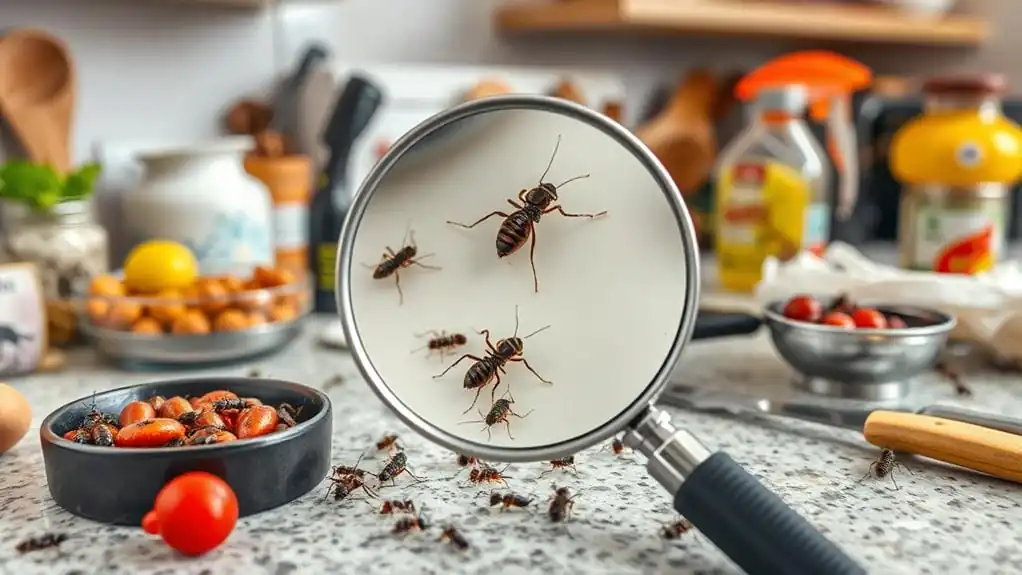You know keeping your tiles spotless can feel like a never-ending task, but it doesn't have to be that way. By using simple DIY methods, you can achieve impressive results without relying on harsh chemicals. For instance, a baking soda paste can work wonders on tough stains, while a vinegar and water solution offers a safer alternative for regular cleaning. But that's just the beginning; there are more techniques that might surprise you. Curious about how to tackle stubborn grime effectively? Let's explore these methods further.
Baking Soda Paste
When you want to tackle tough tile stains, a baking soda paste is one of the simplest and most effective solutions. This method aligns with the eco-friendly cleaning products used by trustworthy carpet cleaning services in Auburn. To make this paste, mix three parts baking soda with one part water until it reaches a thick, spreadable consistency. Once you've got your paste ready, apply it directly to the stained areas of your tiles. Use a soft cloth or sponge to work the paste into the stains gently, guaranteeing it covers the affected spots completely.
Let the paste sit for about 10-15 minutes. This waiting period allows the baking soda to break down the grime and lift the stains effectively. After that, grab a damp cloth or sponge and wipe away the paste. You'll likely see a noticeable difference in the stain's appearance. For stubborn stains, you can repeat the process or apply extra paste and let it sit longer.
Once you've removed the stains, rinse the tiles thoroughly with clean water to confirm no residue is left behind. Not only will your tiles look refreshed, but you'll also appreciate the eco-friendly nature of this cleaning method. Enjoy your sparkling surfaces!
Vinegar and Water Solution
Vinegar and Water Solution
How can you effectively clean your tiles without harsh chemicals? One of the simplest methods is using a vinegar and water solution. This natural cleaner not only tackles grime but also helps eliminate odors. For more challenging cleaning tasks, you might consider professional tile and grout cleaning services that can restore the shine to your floors. To make the solution, mix equal parts white vinegar and warm water in a spray bottle.
Start by sweeping or vacuuming your tiles to remove loose dirt and debris. Once the surface is clear, spray the vinegar solution generously onto the tiles. Let it sit for about 5-10 minutes to break down any stubborn stains or buildup. While you wait, grab a soft-bristle brush or a microfiber cloth.
After the solution has soaked in, scrub the tiles gently in circular motions. Pay extra attention to grout lines, as they often harbor dirt. If needed, you can reapply the vinegar solution for tougher spots. Once you've scrubbed the entire area, rinse the tiles with clean water to remove any residue. Finally, dry the tiles with a clean towel to prevent streaks. This method isn't only effective but also eco-friendly, making it a great choice for your cleaning routine.
Hydrogen Peroxide Treatment
For tough stains and grime on your tiles, a hydrogen peroxide treatment can be incredibly effective. This powerful cleaning agent not only tackles stains but also disinfects, leaving your tiles looking fresh and clean. For those looking for a more extensive cleaning solution, consider professional services like carpet cleaning and pest control that can also help maintain the overall hygiene of your home.
Prepare the Solution: Mix equal parts of hydrogen peroxide and water in a spray bottle. This dilution guarantees that it's strong enough to lift stains without damaging your tiles.
Apply to Stains: Spray the solution directly onto the stained areas of your tiles. Let it sit for about 10-15 minutes to penetrate the grime. If you're dealing with particularly stubborn stains, you can increase the contact time.
Scrub and Rinse: After letting the solution work its magic, use a soft-bristle brush or cloth to scrub the area gently. Rinse the tiles with warm water to remove any residue, and dry them with a clean towel.
Using hydrogen peroxide not only provides a deep clean but also helps keep your tiles looking brand new. Just remember to spot test in an inconspicuous area first to ensure compatibility with your tile type!
Dish Soap and Warm Water
After tackling tough stains with hydrogen peroxide, you might want to opt for a simpler cleaning solution that's equally effective. Dish soap and warm water create a powerful duo for everyday tile cleaning. It's easy to mix and gentle on your tiles while still removing dirt and grime.
To get started, fill a bucket with warm water and add a few drops of dish soap. Stir the mixture until it's well combined. Grab a soft cloth or a sponge, dip it into the soapy water, and wring it out slightly to avoid excess moisture on the tiles. Wipe down the surfaces, focusing on any spots that seem particularly dirty. The dish soap will break down grease and residue without scratching your tiles.
Once you've cleaned the entire area, use a clean, damp cloth to rinse away any soap residue. This step is pivotal, as leftover soap can make tiles slippery and attract more dirt. Finally, dry the tiles with a soft towel to prevent water spots. This method not only cleans effectively but is also safe for most tile types, making it a fantastic go-to solution for regular maintenance.
Essential Oil Infusion
Elevate your tile cleaning routine with the invigorating scent of essential oils. Not only do these natural extracts enhance the fragrance of your cleaning solution, but they also bring added antimicrobial properties to the mix. Incorporating essential oils into your tile cleaning will leave your home smelling fresh and looking spotless.
Tea Tree Oil: Known for its powerful antifungal and antibacterial properties, tea tree oil is perfect for tackling tough grime and mold on your tiles.
Lavender Oil: Not only does lavender oil have a calming scent, but it also possesses antimicrobial qualities that help disinfect your surfaces while creating a rejuvenating atmosphere.
Lemon Oil: With its natural acidity, lemon oil cuts through grease and grime effortlessly. Plus, its vibrant aroma will uplift your cleaning experience.
To use, simply add 10-15 drops of your chosen essential oil to your cleaning solution. Mix well, and enjoy the delightful fragrance while you scrub away dirt and stains. Your tiles will be spotless and your space will smell wonderful!
Conclusion
By trying these five DIY tile cleaning methods, you can easily achieve spotless results without the use of harsh chemicals. Whether you're using a baking soda paste for tough stains or a simple dish soap solution for daily upkeep, each technique offers its own benefits. Don't forget to experiment with essential oils to add a pleasant fragrance! With a little effort, your tiles will shine, making your space feel fresh and inviting. Happy cleaning!



